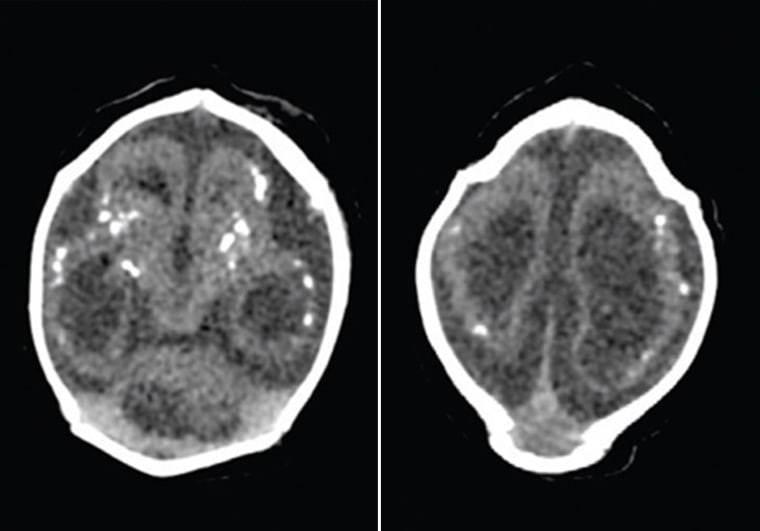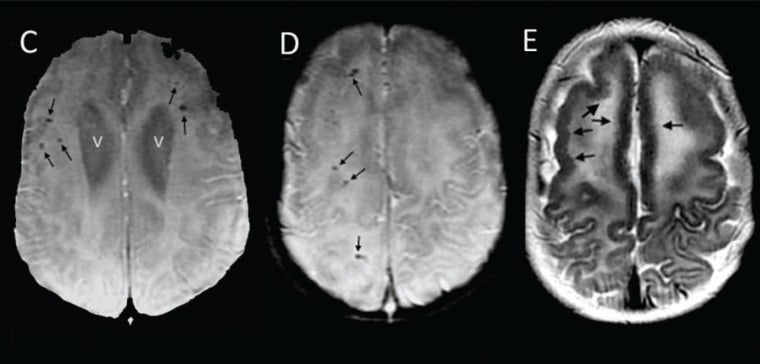Two new studies add important details to what doctors know about the Zika virus and the damage it does to babies’ brains.
One finds clear Zika damage in 6 percent of all babies born to women infected with Zika in the U.S. – and 11 percent of those infected early in pregnancy.

A second study finds the virus can stay and grow in the brain of a developing fetus and also may help explain how the virus gets from a mother into her baby in the first place.
Taken together, they paint a clearer picture of the risk and help confirm that the earlier in pregnancy a woman is infected with Zika, the worse it is for her baby.
“This is an important study,” Centers for Disease Control and Prevention director Dr. Tom Frieden said in a statement.
“Zika poses a real risk throughout pregnancy, but especially in the first trimester; it’s critical that pregnant women not travel to areas where Zika is spreading.”
The CDC’s Dr. Margaret Honein and colleagues examined the cases of 442 women infected with Zika while pregnant.
“Our findings show that Zika virus can continue to replicate in infants’ brains even after birth, and that the virus can persist in placentas for months – much longer than we expected."
“Based on preliminary data from the U.S. Zika Pregnancy Registry, among 442 completed pregnancies, 6 percent overall had a fetus or infant with evidence of a Zika virus–related birth defect, primarily microcephaly with brain abnormalities,” they wrote in the Journal of the American Medical Association.
And women who did not remember having symptoms from Zika infection were just as likely to have a baby with a birth defect as women who did have symptoms – a finding that supports CDC’s policy of screening all pregnant women for Zika if there’s a chance they may have been infected.
Eleven percent of women infected during the first trimester had babies with birth defects.
A second study helps explain why – it found the Zika virus can take its time replicating and spreading in the placenta and in the brains of developing fetuses.
Related: Florida's Zika Outbreak is Over, Although Cases Continue
“Our findings show that Zika virus can continue to replicate in infants’ brains even after birth, and that the virus can persist in placentas for months – much longer than we expected,” said the CDC’s Julu Bhatnagar.
“We don’t know how long the virus can persist, but its persistence could have implications for babies born with microcephaly and for apparently healthy infants whose mothers had Zika during their pregnancies.”
Babies born apparently healthy may not be in the clear, Honein said. "It is important to follow up with these infants during their first year or two of life," she said. "What is their learning capability? Are there any hearing loss issues later on? Any eye abnormalities?"
A third study, done in Brazil, found up to 42 percent of babies infected int he womb may suffer birth defects -- most severe enough to cause still birth or miscarriage. Dr. Karin Nielsen-Saines of UCLA and colleagues only studied 125 pregnant women, so the study's less powerful than the CDC study with more women.
Zika, which has spread across much of central and South America, the Caribbean and into Florida and Texas, as well as in Asia, is most notorious for causing the brain defect known as microcephaly. Babies infected in the womb lose brain tissue as the virus attacks, and the skull never fully develops, or even collapses in on itself, causing a small head.
Related: Images Show Zika's Brain Destruction
Zika can cause other damage in the brains and bodies of fetuses, even as it barely causes symptoms, at most usually a rash and fever, in adults. Some women with Zika-affected babies haven’t even noticed the infection while they were pregnant.
Bhatnagar and colleagues studied tissue samples taken from eight babies with microcephaly who died soon after being born and from the placenta of 44 women, including 22 whose babies were damaged by Zika and 22 whose babies seem healthy even though the mothers had Zika infections.
“Zika poses a real risk throughout pregnancy, but especially in the first trimester; it’s critical that pregnant women not travel to areas where Zika is spreading.”
They found levels of Zika virus genetic material were 1,200 times higher in the brains of the full-term babies killed by Zika than in the placenta or in the fetuses miscarried or aborted before birth.
They also found evidence that perhaps late in pregnancy, the fetus can fight off Zika infection. They found evidence of the virus in the placentas of eight women infected during the third trimester who had apparently healthy babies.
“The absence of apparent abnormalities in these infants could be because Zika virus may not have transferred from the mother to the fetus in utero because the late-pregnancy placenta might have protected the fetus, or an effective fetal immune response might be present,” the team wrote in their report published in Emerging Infectious Diseases.
It might also be that the infants’ brains were developed enough that the virus did little or no damage. The virus seems to home in on developing brain cells, but mature brain cells may be less vulnerable.
The team also found evidence shedding light into how the virus gets across the placenta, the organ that connects a mother and baby, to infect a developing fetus.
They found that immune cells called Hofbauer cells—they are found in the placenta – may be carrying the virus into the bloodstreams of developing fetuses.
Related: Zika Might Affect Adult Brains, Also
The babies will be watched to make sure, the CDC team said.
The CDC is watching or knows about more than 1,100 pregnant women in the U.S. who were infected with Zika while pregnant.
Last week, a team reported that cases of microcephaly quadrupled in Colombia after Zika outbreaks there. The findings confirmed what experts suspected – that the earlier in pregnancy a woman is infected, the greater the damage to her baby.
Wednesday’s study suggests this is not only because the developing fetus is more vulnerable because it is growing so fast, but perhaps because the virus has longer to spread and do its damage.
Some people had questioned whether Zika virus actually caused microcephaly or whether it might work in concert with other infections or factors such as poor nutrition, but evidence is growing that Zika acts alone in causing the birth defects.
“CDC continues to recommend that pregnant women not travel to areas with Zika,” the CDC advises.
“If a pregnant woman travels to or lives in an area with active Zika virus transmission, she should talk with her healthcare provider and strictly follow steps to prevent mosquito bites and sexual transmission of Zika virus.”

